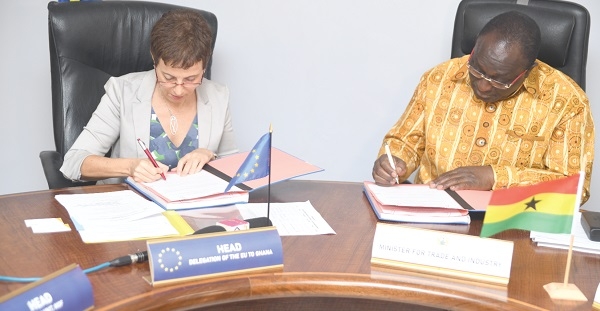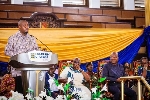EU-Ghana Interim Economic Partnership Agreement starts today
 EU Ambassador to Ghana, Mrs Diana Acconcia (L) and Ghana's Trade and Industry Mminister Alan Kyerematen (R) signing a deal
EU Ambassador to Ghana, Mrs Diana Acconcia (L) and Ghana's Trade and Industry Mminister Alan Kyerematen (R) signing a deal
The Executive Vice-President and Commissioner for Trade of the European Union, Valdis Dombrovskis and Ghana’s Minister of Trade and Industry, Mr Alan Kyerematen, have jointly announced via a press statement dated Thursday, 1 July 2021 that today marks the start of the effective implementation of the interim Economic Partnership Agreement (iEPA) signed between the European Union and Ghana.
Since December 2016, the iEPA guarantees duty-free quota-free access to the EU market for products made in Ghana and, as of today, Ghana starts liberalising access to its market for 80% of the total volume of EU exports.
“This is crucial for developing and diversifying our bilateral trade”, the statement said, adding: “It also creates better opportunities for EU companies to trade and invest in Ghana and produce goods for export to the wider African market under the preferences available under the African Continental Free Trade Area”.
The removal of tariffs on intermediary goods and machinery from the EU under the iEPA, according to the statement, “will mean cheaper inputs for Ghanaian production”.
“This will also make locally-produced goods more competitive and support industrial development in Ghana and the country’s integration into global value chains”, it added.
In addition, the two parties said “trade-related development cooperation under the iEPA will facilitate reforms of the fiscal revenue system, improve the business environment and promote the upgrading of the productive sectors in Ghana”.
Although the iEPA was concluded in December 2007 and ratified by Ghana in 2016, the implementation of the tariff liberalisation schedule was delayed pursuant to technical adjustments agreed between the EU and Ghana.
The necessary rules of origin documents to be used for trading including the certificates of origin and origin declarations have now been developed and the codes and systems are in place for the start of the effective implementation of tariff cuts for EU products entering Ghana.
Also, trading under the iEPA “reaffirms the deep interest of both Ghana and the EU to strengthen their long-standing trade and economic relationship”.
“It also underscores their shared ambition to enhance relations between the EU and the Economic Community of West African States (ECOWAS) and African states more broadly”, the joint statement said.
In 2020, the European Union (EU) signed a €4.1-million grant agreement with Ghana for the implementation of four projects targeted at improving the country's competitiveness and export capacity on the international market.
The grant fell under the Interim Economic Partnership Agreement (IEPA) that was renewed between Ghana and the EU in 2016.
As part of the agreement, €2.98 million was to be extended to the Ministry of Trade and Industry (MoTI) for technical assistance, in addition to a direct grant of €800,000.
The Ghana Export Promotion Authority (GEPA) and the Ghana Investments Promotion Centre (GIPC) were also to receive €221,000 and €147,000, respectively, to support the development of fruit, cassava and cosmetic value chains.
At a ceremony in Accra in February 2020, Mr Kyerematen signed the grant documents on behalf of Ghana while the EU Ambassador to Ghana, Mrs Diana Acconcia, signed on behalf of the EU, with the chief executive officers (CEOs) of GEPA and GIPC, Ms Afua Asabea Asare and Mr Yofi Grant, respectively, initialling for their institutions.
Mr Kyerematen described the signing of the grant agreement for the four projects as a historic milestone in Ghana-EU economic relations, saying the projects would boost Ghana’s access to global markets significantly.
“As a government, this agreement is important because it will enable us to put in place the institutional framework that will help us take advantage of economic partnerships,” he said.
He said the grants offered Ghana the opportunity to diversify its portfolio of exports to the EU that were currently limited to agricultural commodities and, recently, oil.
“The government has embarked on a vigorous programme to industrialise and add value to the country’s exports, so this grant has come at the right time,” he said.
For her part, Mrs Acconcia said the grant was important, as it would improve Ghana’s trade relations with the EU and catalyse its access to international markets.
She stressed that Ghana had the potential to diversify its economy through value addition to export commodities to make them competitive on the global stage.
“This grant is coming at an opportune time when the African Continental Free Trade Area (AfCFTA) has now become a reality. And so we will do everything that we can to support capacity building at the MoTI, the GIPC and the GEPA for Ghana to take advantage of the market access that comes with it,” she said.
Ghana signed the IEPA with the EU in 2007 and ratified it the following year.
It was again renewed in August 2016 and ratified.
The main reason Ghana entered into the IEPA was to avoid trade disruptions, particularly for goods that were exported to Europe.
The agreement was also meant to ensure that there were laid-down trade regulatory regimes that would support trade between Ghana and the EU.
Source: classfmonline.com
Trending Business

‘Make Africa borderless now!’ campaign to be launched in Accra
01:08
AngloGold Ashanti's Obuasi Mine and Ashanti Green Initiative launch new chapter in community empowerment
19:26
MoFA begins poultry distribution in Ashanti Region under 'Nkoko Nketenkete' initiative
18:50
GRA, GUTA join forces for smooth rollout of new VAT Law
12:24
NPA commits to sustainable development through effective petroleum regulation – Tameklo
11:53
Ghana holds debt restructuring talks with Saderea bondholders
11:20
IMF-reported $214m gold trading loss occurred after my exit from PMMC – Nana Awuah
10:08
PMMC turned around from crisis to record profits by 2024 – Former MD
09:42
Leila Djansi: Filmmaker calls for hourly wages and commission-based pay to improve work attitudes in Ghana
00:53
C/R: Planned power outage to hit Cape Coast on January 8
21:15



